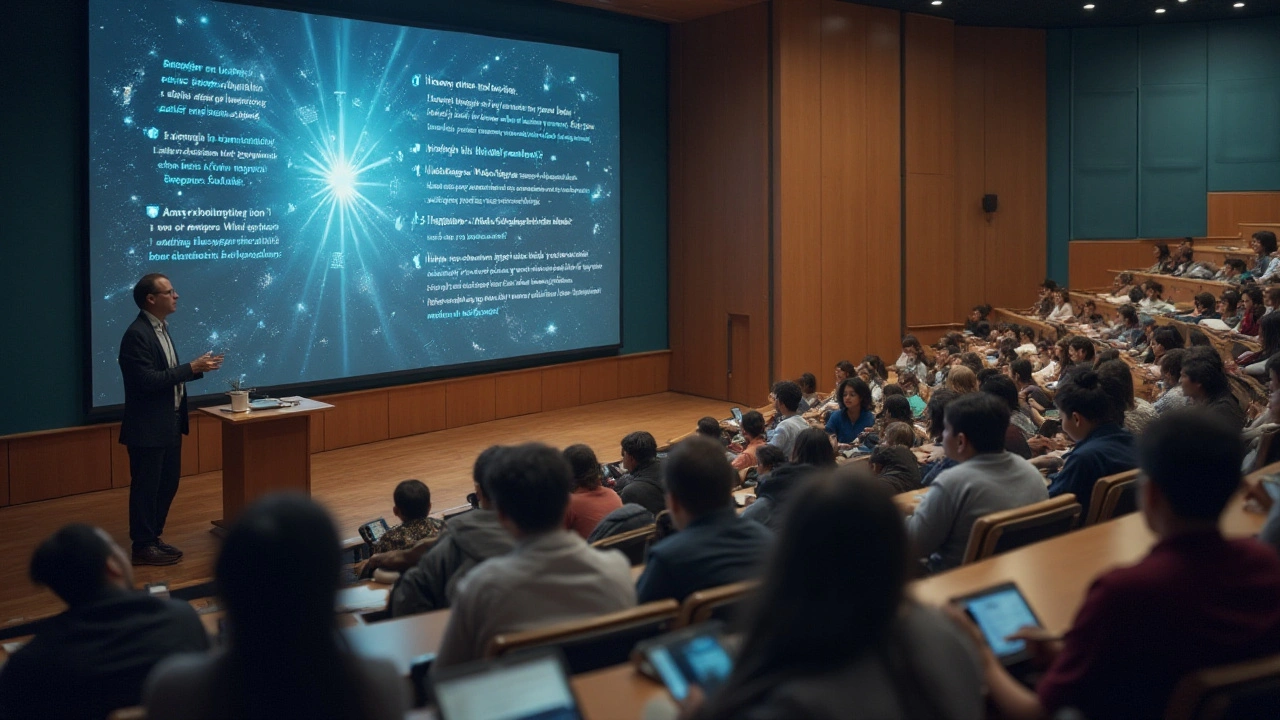AI is Transforming Learning: Embrace the Future Now

The world we live in today feels like it's straight out of a sci-fi novel, with an invisible force called Artificial Intelligence quietly steering the wheel. In education, AI is not just a fleeting trend; it's a substantial change that promises to revolutionize how we think, learn, and work. So why should we start learning about AI today? Because it's already woven into the fabric of our everyday lives, influencing everything from the way we communicate to the jobs we hold.
Diving into the world of AI might sound intimidating, but it's not reserved for tech whizzes alone. The key is to start with curiosity. Whether through online courses, community workshops, or just an evening experimenting with AI tools, there's a path for everyone. AI learning is not just about coding or algorithms; it's about understanding its potential to change industries, unlocking new creative possibilities, and even enhancing personal productivity.
By demystifying AI, we can better prepare ourselves and our children for a future where this technology isn't just a part of the conversation—it's a game-changer. It's about more than just keeping up with the latest tech trends; it's about empowering yourself to navigate and thrive in an AI-driven world. Let's take the leap into AI learning today and embrace the endless opportunities it offers.
Understanding the AI Landscape
As we peer into the fascinating world of Artificial Intelligence, it becomes clear that AI isn't just a tech industry buzzword—it's a transformative phenomenon influencing countless aspects of our lives. From powering search engines and personalizing our social media feeds to enacting complex facial recognition security systems, AI has woven itself into the very fabric of modern existence. Learning about AI doesn't just mean mastering complex algorithms; it's about understanding its potential to fundamentally reshape how we interact with technology and each other.
At the heart of AI are technologies like machine learning, a method where computers glean insights from data and improve their actions autonomously. The automation spectrum AI offers is broad, delving into fields as diverse as healthcare, finance, and entertainment. For instance, AI systems can predict patient outcomes with remarkable accuracy, enabling more effective treatment pathways in medicine. In finance, AI-driven algorithms manage and predict stock trends, altering the investment landscape profoundly. These are not futuristic projections—they're happening now, underscoring the compelling imperative to get acquainted with AI.
Understanding AI isn’t just about grappling with technical concepts; it’s also about recognizing its ethical dimensions. Concerns about privacy, bias, and transparency come to the forefront as AI systems make more independent decisions. As noted by Stanford's AI expert Dr. John Smith,
"Understanding AI's capabilities and boundaries is crucial. We must navigate its ethical landscape with as much acuity as its technological nuances."This underscores a significant conversation: While AI holds the power to innovate, it also calls for responsible stewardship and policymaking.
For those new to AI, learning the basics can be simplified into actionable steps. Start by exploring resources like online courses or AI-focused webinars that offer a foundational understanding. Then, engage in community learning—collaborating with others can enhance comprehension and innovation. As we unravel AI's potential and its intricate landscape, we’re better prepared to leverage its advantages and curtail any potential drawbacks. This isn't just for tech enthusiasts; comprehending AI's landscape benefits anyone aiming to thrive in a technology-driven future.
To frame the current state of AI and its vast potential, consider this: A report by McKinsey predicts that by 2030, AI could deliver an additional global economic output of $13 trillion, boosting GDP by about 1.2 percent annually. This underscores an essential fact—AI is not just a tool of the future; it's a catalyst for shaping contemporary economies and societies.

AI in Education
The realm of education is undergoing a profound metamorphosis, led by Artificial Intelligence. Previously, learning was restricted to traditional methods, primarily textbooks, and lectures. Today, with the advent of AI learning, the landscape is enriched with personalized experiences that are tailored to fit each student's unique pace and style. Educational technologies driven by AI are not only enhancing learning experiences but also making them more accessible and inclusive. Modern classrooms and online platforms are equipped with AI tools that ensure students are supported in their learning journeys like never before.
One of the most captivating features of AI in education is its ability to adapt to the needs of individual students. Adaptive learning technologies monitor a student's progress and adjust the difficulty level of tasks accordingly, filling knowledge gaps and optimizing the learning curve. Take, for instance, platforms like Duolingo or Khan Academy, which use AI to tailor exercises and track comprehension. These platforms make it possible for learners to achieve their goals efficiently while retaining information successfully.
The embrace of AI in education extends further into the realm of technology education itself, making it possible for students to learn how to interact with and develop AI systems. Institutions worldwide, including prestigious universities, have integrated AI courses, reflecting the increasing demand for such knowledge. Implementing AI technologies in the curriculum is not merely about teaching students the basics of code. Instead, it's about nurturing problem-solving skills and fostering creativity, allowing room for innovation.
"Artificial Intelligence is about replacing human decision-making, enhancing human capabilities, and creating new ways of learning," said Andrew Ng, co-founder of Google Brain. "With AI, we are not just limiting ourselves to education but exploring the possibilities of a smarter future."
A fascinating aspect often overlooked is AI's potential in automating administrative functions, enabling educators to focus more on teaching. AI can handle time-consuming tasks such as grading, scheduling, and managing resources, thus allowing educators to invest their energy where it truly counts – enhancing student interaction and engagement. This shift not only makes the education system more efficient but also more human-centric, where technology serves as an aid rather than an obstruction.
However, being well-versed in AI and understanding its implications is important for everyone, not just those pursuing technical careers. Since many industries are integrating AI, proficiency in this area can open up new career opportunities. Early education in AI empowers children with essential skills they will need in future job markets. A report by the World Economic Forum suggests by 2025, roles centered around data, AI, and engineering will see increasing demand, making future skills indispensable.
As AI continues to shape educational landscapes, it is crucial for educators, parents, and students alike to be forward-thinking. Proactively engaging with AI technologies ensures that we are not caught off guard by technological advancements, but instead embrace them as opportunities for growth. The future of AI in learning holds immense potential, urging us to adapt education systems in ways that foster creativity, inclusivity, and critical thinking among learners of all backgrounds.

Practical AI Skills for All
Learning AI skills doesn't mean you must become a software engineer or a data scientist; it means gaining the competence to harness technology that is deeply embedded in everyday life. One of the most approachable skills is understanding how to interact with AI-driven platforms, like voice-activated assistants or recommendation algorithms that guide our online experiences. These interactions offer a foundation for more advanced skills, like recognizing AI's role in data analysis, which is crucial for business, education, and personal projects.
Imagine customizing your learning path to fit your needs. AI technology offers learners dynamically adjusted instructional materials based on performance, making personalized learning more accessible. It’s not just for academic purposes either; these adaptive systems can be applied to everything from learning a musical instrument to mastering a new language. Understanding how to leverage such adaptive technologies can enhance your efficiency and productivity in multiple areas of life.
For those interested in delving deeper, many universities and platforms offer beginner-friendly courses on AI fundamentals. Coursera's AI for Everyone by Andrew Ng is designed specifically to demystify AI essentials for non-experts, allowing learners to engage with technology confidently and responsibly. As AI becomes more pervasive, the ability to critically assess the ethical implications of AI decisions becomes invaluable. AI's potential to impact industries positively or negatively cannot be overstated, and understanding these possibilities will empower individuals to make informed decisions.
"The greatest danger of Artificial Intelligence is that people conclude too early that they understand it." - Eliezer Yudkowsky
In the professional realm, agile collaboration with AI tools can propel your career by automating mundane tasks and providing data-driven insights. A proficient query with AI can extract valuable insights from vast data sets or automate routine processes, freeing up creative energy for more strategic tasks. Organizations are slowly but surely integrating AI skills into their core requirements, even for roles that traditionally did not involve technology. Understanding these future skills can give you an edge in job markets that are becoming more tech-centric by the day.
AI in education empowers teachers and students alike, optimizing learning experiences with data insights. While AI can't replace the nuanced judgment of a human faculty member, it can support educators by identifying students’ strengths and weaknesses, enabling more targeted and efficient teaching strategies. The democratization of AI, with its widespread availability, supports lifelong learning and self-improvement, making it a promising ally for startups and multinational corporations evoking a universal trend towards innovation and improvement.

Future of AI in Learning
The horizon of educational landscapes is glittering with the possibilities that AI learning introduces. As we look to the future, AI promises not only to streamline the teaching process but also to offer personalized and adaptive learning experiences that were previously unimaginable. Imagine a classroom where the technology caters to each student's unique pace and style, making learning not only more accessible but also more engaging. With AI, education is set to become an arena where learners are not just passive recipients of information, but active participants in their own discovery and mastery of future skills.
In this brave new world, the potential applications of Artificial Intelligence are staggering. Schools and universities are starting to integrate AI-driven technologies into their curriculums, enabling teachers to focus on what they do best: inspiring creativity and critical thinking. AI tools can grade assignments, provide real-time feedback, and even suggest resources tailored to a student's needs. This not only reduces the burden on educators but also enhances the quality of the education provided. As a result, we might see an education system evolving into one that values soft skills—creativity, problem-solving, emotional intelligence—equally alongside traditional academic knowledge.
"AI in education is not just about efficiency. It's about equity and creativity, giving every student a chance to learn at their own rhythm," says Anant Agarwal, CEO of edX and professor at MIT.
There is also the exciting potential for lifelong learning opportunities that AI presents. With the rapid development of technology, individuals now have the unprecedented chance to upskill and reskill throughout their lives. Technologies such as virtual personal tutors and simulations can offer immersive and interactive learning experiences for both personal and professional growth. This accessibility means that technology education will not be limited to the young but will extend to all ages, promoting a culture of lifelong learning.
Impact on Future Professions
The implications of AI in learning stretch far beyond the classroom. As the job market evolves, AI is poised to redefine future professions, with AI for beginners becoming a standard requirement across various industries. By enabling real-time data analysis and decision-making, AI skills will be invaluable in fields like healthcare, finance, automated transport, and many others. Preparing our children—and ourselves—means understanding not just the technology itself, but its applications and ethical considerations in a rapidly changing world.
Consider the current statistics that project a growing demand for AI-related skills across sectors. A recent report by LinkedIn found 'AI specialist' among the fastest-growing job roles, with a 74% annual growth rate. It’s not just tech companies driving this demand; businesses from all walks of life are seeking individuals knowledgeable in artificial intelligence to derive insights from complex data sets. AI learning is not only about understanding algorithms; it's about applying these insights to solve real-world problems efficiently.
The Road Ahead
The road to the future of AI in learning is paved with opportunities but also challenges. There are concerns about privacy, data security, and the need to ensure inclusivity across all socio-economic backgrounds. As AI becomes more entrenched in educational systems, setting ethical guidelines and fostering an environment of transparency and trust will be crucial. This shift heralds a new era of education where technology, rather than replacing human elements, becomes an indispensable tool that amplifies them.
Engagement with AI in learning isn’t optional anymore; it’s essential. By taking proactive steps today to understand and integrate AI into our educational practices, we prepare ourselves and future generations for a world that values knowledge, adaptability, and ethical responsibility. The future of AI in learning holds immense potential—it’s an exciting time to be part of this journey, as we stand on the cusp of a transformative era in education.